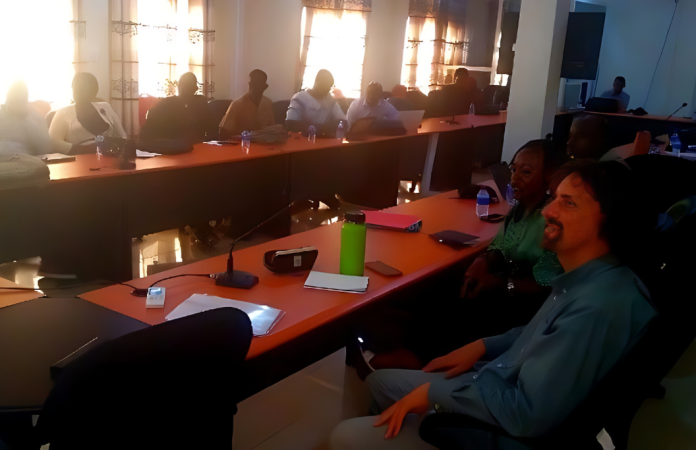By: Kebba AF Touray
Officials of the University of the Gambia and their Spanish counterparts have teamed up to fight and mitigate the menace and increasing threats of salt water intrusion in the Gambia.
The officials of the two nations’ higher institutions of learning held an interface on Monday, 19 February 2024, at the University of the Gambia to brainstorm on the project called SALIBA, and to avail all partners the opportunity to scrutinise the proposed document of the project by adding their inputs on a befitting project document that will help in the implementation and realization of their objectives in the pursuit of mitigating the challenges of salinity in the Gambia.
Speaking to reporters after their interface, Pablo Rodriguez, a Spanish partner, informed the media that the goals of SALIBA project include but not limited to assessing the impact of salinity within the aquatic biodiversity of freshwater areas, assessing the impacts of salinity within riverine carbon cycles, assessing the impacts of salinity on local communities, and to develop adaptation strategies on salinity.
“The SALIBA project is funded by the National Ministry of Science in Spain, and it is a three year project with the aim of assessing the effects of salinity of the Gambia river on biodiversity, the global carbon cycle and its effects on local communities,” he said, adding that their partners such as the UTG have been involved during the proposal stage of the project. He said the project is about to commence, a kick off meeting has been organised to allow their Gambian partners to give their input in the project.
“It is coordinated project with three components namely biodiversity, biochemical and social dealing with its effects on the communities. We are here today to do this kick off meeting and from now on, we will be working on research for the project,” he said.
He lamented that the effects associated with salinity on affected communities include but is not limited to reduction in rice production, freshwater fish species and mangroves.
Nuria Catalan, Researcher at the Environmental and Water Studies Council from Barcelona, said she has been working in diverse ecosystems, starting with the Mediterranean Sea, adding that they also have challenges in climate that is making Spanish rivers drier.
“What we try to understand in all these systems is that the carbon that arrives from catchment areas and how the process goes, is when it reaches them late. This is key for the project as we try to assess salinity trends or draw trends in aquatic ecosystems to ensure that the changes are improved,” she said.
She said one important thing for them to identify is to study sites of salinity, where they can access the different compartments that are important for carbons, stressing that they also need to identify sites where they can install censors in the long time so that communities can monitor emissions and carbon in the different compartments.
“Today is the kick off meeting of the project. SALBIA is the acronym for the effect of sea water intrusion in the Gambia and it is about how sea water intrusion in rivers is affecting the biodiversity and ecosystems in local communities,” Miguel Canedo, a coordinator of the SALIBA Project, explained, adding that they are going to measure salinity and deploy different censors that will measure salinity every ten minutes for a year or more to understand the dynamics between precipitations, the climate and sea level rise and dams.
On how to mitigate salinity, he said “we need to understand all of these. We need to understand ideology of rivers and how salinity changes along time, and to also predict what is going to happen in the future. We are going to deploy censors and we are also going to go by boat to measure salinity ourselves”.
Dr. Mamudou Jallow, head of the Biology Department at the UTG, said their Spanish counterparts secured a grant and want to look at salt intrusion, which he said is a problem in the Gambia, but due to lack of funding, researchers in the Gambia cannot do it.
“So, they came up with the proposal and we all made our inputs and today we are doing the kick off meeting and launching the project,” he said.
He stressed that the project is beneficial to the Gambia and has a capacity building component which is very crucial in the area of equipping the biology department of the UTG with a laboratory, something that has been a challenge for the department. He added that the project also avails an opportunity for Gambian students to travel to Spain for an exchange visit and training workshops, and will also expose them to laboratory protocols to ensure that salinity monitoring is sustained once the project phases out.


















